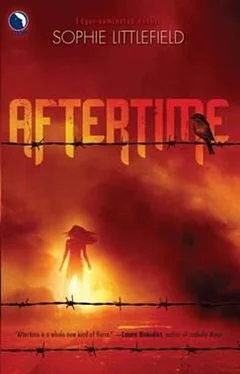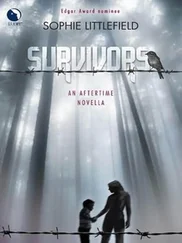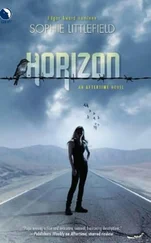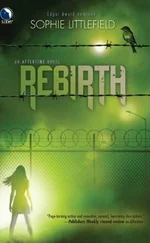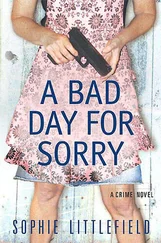If the poison was within her she’d know.
Wouldn’t she?
SMOKE OFFERED CASS HIS HAND, AND SHE allowed him to help her out of the old chair. They followed Lyle up the basement stairs. At the landing he turned and said regretfully, “I think we’d better leave the light here. I don’t like to get ’em riled up at night. They keep thumpin’ and scratchin’ at the walls if they see lights on in here, makes it hard to sleep.”
He set the flashlight on the landing and led them back down the first floor hall, up the steps to the second floor, where moonlight seeped through the windows.
“This is me,” Lyle said, pointing to the room they’d come through earlier, when he rescued them. “Y’all take the guest room there. It’s got a nice queen bed.”
“Oh, we’re not-” Cass said, realizing he meant for them to sleep together. Then she shut her mouth, embarrassed. There were only two rooms, separated by a small bathroom.
“I’ll take the floor,” Smoke said.
“I didn’t mean to make assumptions, but you got a shot at a bed here, why not take it?” Lyle said. “Might as well get a good night’s rest when you can.”
“It’s all right,” Cass said. “I mean, we can share. It’s just…”
Just nothing, just a man and woman, exhausted from fear and adrenaline. No doubt they’d be out the minute they hit the bed. There was nothing suggestive or sexual about it.
Aftertime was about needs. Basic necessities. Social conventions had long since disappeared. Two people could share a pail of water, or a can of peas, or a bed and it meant nothing more than survival-another day or hour or minute on a planet that had grown increasingly inhospitable.
“There’s a bucket in the bathroom,” Lyle said. “I wish I could offer you better. I clean it out every day, though, and I keep a stack of clean rags in there. I wash ’em down at the creek. I’ve never been the best housekeeper, but I guess it’ll do.”
“Thank you,” Smoke said. “Seriously, man. I’m sorry I got a little testy with you back there-”
Lyle held up a hand to stop him. “No worries, my friend. I reckon all our nerves are shot to hell. I’m honored to have you. Y’all take first shift in the john if you want-I’ll be up for a while.”
Cass went first. After, she rested her hands on the sink and gazed at the mirror. She could see very little in the moonlight-but it was the first time she’d seen her reflection at all.
Her face was smooth, unmarked. Her lips were dry and chapped, but there were no signs that she’d chewed them. She felt a faint stirring of hope-maybe she’d recovered before she got really bad. Before…she’d had a chance to do anything reprehensible.
She touched her cheeks with her fingertips, tentatively. She was lucky not to have been bitten there. Whatever it was- whoever it was-who rescued her from the Beaters’ feeding frenzy, they had been quick. There hadn’t been time for the Beaters to consume anything more than the strips of flesh from her back.
Cass’s hands went automatically to the small of her back, the wounds she could reach. Near her tailbone was a raw patch where, as far as she could tell, a section of skin about four inches long had been ripped away. When she first woke, her exploring fingers touched something wet and the pain was unbearable, and it had been days before she could stand to touch herself again.
The Beaters loved only flesh. Skin. They did not eat muscle or sinew or bone, and they chewed sections of flesh free and then peeled them away, their jaw strength magnified by the disease and by their furious hunger. For that reason the wounds they made tended to be elongated, shreds and strips peeled away. Of course, when they were done it didn’t matter, since they feasted until little was left. Skinned, but otherwise intact, their victims were left alive and in agony, their deaths hours or days away. They died in the throes of the fever, but at least they never lived long enough to turn into monsters.
But Cass’s attackers had presumably been interrupted. How, and by whom, she had no idea. Still, she was grateful that the Beaters had time to tear only a half-dozen holes in her back, from the base of her spine to her shoulder blades.
She pulled her shirt over her shoulders and slowly turned until she could see her back in the mirror, dreading her reflection, but the wounds weren’t the festering and oozing things she feared they would be. They were healing, regrowing flesh where it had been taken. In the mirror they seemed to glisten, pale layers of skin filming over the red and raw underlayers.
Cass realized she had been holding her breath and turned back, pulling on her shirt as she exhaled slowly. Her hair, soft from its recent shampoo, stuck out in jagged clumps where Smoke had sheared it off, but at least it didn’t look like she’d pulled it out herself. She looked a little like a punk rocker from thirty years earlier-her mother’s time, when women used to cut their hair short and spike it. She thought of wetting it down to tame it and her hands went automatically to the faucet and turned the handle before she remembered the futility of the gesture. Water had not run in these pipes in months.
As the Siege worsened, it eventually became clear that not only did the government not have the ability to repel the relentless bioterrorist attacks-they were never going to be able to identify with certainty who had unleashed them. The toxins were manufactured in Japan, Russia, even Finland, outsourced across a thousand corporate shells, but terrorist groups in Greece and Sri Lanka and Colombia and Somalia took credit along with the usual suspects. As every major food crop was decimated and livestock lay rotting in stinking shallow graves, people’s fears morphed into a terrible fury. Rioting, roving bands of citizens stormed every municipal and government office and the very people who were trying desperately to hold on to order were either dragged out and beaten, or ran for their lives. One by one, substations on the power grid flickered out; water stopped running through the municipal pipes; cell towers went dark. And still, everyone kept making mistakes, forgetting that the light switches no longer turned on lights, that faucets wouldn’t deliver water, that phones wouldn’t ring or connect anyone, that stoplights would never guide them and toilets would never flush. It took a while, but eventually everyone adapted. The things from Before-the hydrants and lamp poles and public restrooms-gradually, they became just another part of the landscape, unnoticed and untouched.
And yet here she was, hands turning the cold knobs, expecting water to fill the basin. Cass closed her eyes and focused on the sensation; she could almost feel the water rushing over her fingers. She imagined water arcing from a drinking fountain, remembered how it felt pooling in her mouth, cold against her tongue. She remembered a garden hose on a hot day, testing the water dribbling out of it and waiting until the sun-heated water ran cool before putting a thumb over the nozzle and making a rainbow-dappled spray for Ruthie to run through. Droplets sparkled like a thousand tiny crystals in the sun.
Anguish seized Cass-not just a longing for another time, but a sense that she herself was lost, that her exile from the rest of the world had left her without a place to return to. She was missing two months of her life, and during that time, the world had moved on without her. The Beaters had evolved. Citizens had evolved, too. The shelters were full of survivors who made homes inside the schools and libraries and supermarkets and churches. In the time since she was taken, they had shared meals and made friends. They’d buried their dead and given birth and made love. They’d cried and grieved and laughed and created new memories.
Читать дальше
Конец ознакомительного отрывка
Купить книгу
